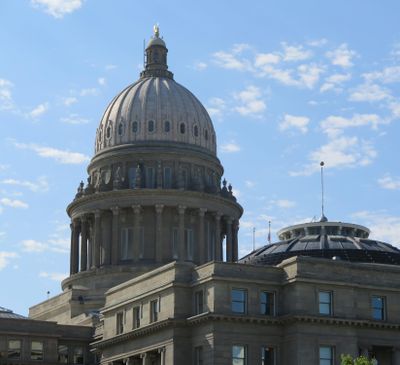This column reflects the opinion of the writer. Learn about the differences between a news story and an opinion column.
Eye on Boise: Vermont’s new disclosure law makes Idaho one of just two states without

Thanks to legislative action this year in Vermont, Idaho is now one of just two states in the nation with no requirements for personal financial disclosure by state lawmakers or other elected or appointed officials. Idaho had been one of three states with that distinction. Now it’s just Idaho and Michigan.
S.8, the legislation that Vermont Gov. Phil Scott signed into law on June 14, includes a series of ethics reforms; it passed the Senate unanimously, and the House by 120-24. Its provisions include:
Disclosure: Requirements for candidates and officeholders to disclose all income sources over $5,000, though not the specific amounts. The requirement includes income for both the candidate and candidate’s spouse.
Candidates also will be required to disclose all entities on which they serve, companies in which they or a spouse own more than 10 percent, leases or contracts with the state in which the candidate or spouse has a 10 percent or more interest, and whether the candidate’s spouse or domestic partner is a lobbyist.
Also, candidates for statewide offices will be required to release their federal tax returns.
Revolving door: Legislators or executive officers will have to wait one year after leaving office before they could become lobbyists.
Contractor contributions: Sole-source contracts with those who have made campaign contributions are prohibited, as are campaign contributions by those holding state sole-source contracts.
Ethics commission: Vermont will establish a State Ethics Commission, effective Jan. 1, 2018, with power to accept, review and refer complaints.
Conflicts: Every town, city and incorporated village in Vermont is required to adopt conflict-of-interest prohibitions for its elected officials and employees by July 1, 2019. The Vermont secretary of state will then accept written complaints of violations, forward them to the town in question, and report them to the Ethics Commission.
Vermont’s move comes as the Idaho Legislature has appointed a working group of 10 lawmakers to study possible changes to Idaho’s laws on campaign finance reporting and ethics. Idaho currently has no “revolving door” law or financial disclosure requirements.
Those are among the reasons the state earned a D-minus in the State Integrity Investigation in 2015, which compared states and their ethics and disclosure laws, practices and enforcement.
Otter weighs in
Idaho Gov. Butch Otter issued this statement on the Idaho Supreme Court’s ruling upholding his veto of the grocery tax repeal bill:
“I appreciate the Supreme Court’s thorough and scholarly analysis of all the issues involved in this case. I am pleased that my veto was upheld. But more than that, I applaud the Court’s conclusion that a bill can only become law if it is presented to the Governor before the Legislature adjourns sine die. That may require changes in how the people’s business is done. I hope the result will provide greater transparency in the lawmaking process.”
The money race for 1st Congressional District
The first round of campaign finance reports is out in Idaho’s 2018 race for the open 1st Congressional District seat that current Rep. Raul Labrador is leaving to run for governor, and so far, GOP hopefuls David Leroy and Russ Fulcher have been actively raising funds.
As of June 30, Leroy had raised more than $114,000, with he and his wife contributing $50,000 of that. At the close of the reporting period, Leroy had spent $32,709 and had $81,295 cash on hand for the campaign.
Fulcher reported raising $53,723 and spending just $846, leaving $52,877 in the bank.
Neither candidate reported any donations from PACs. All their contributions came from individuals.
Both candidates issued statements touting their initial fundraising. Fulcher said he piled up the whole batch in just seven days. Leroy said he received contributions from 89 donors, with more than 90 percent of the money coming from individuals in Idaho.
Both also announced new endorsements:
Leroy said veteran Idaho attorney and lobbyist Roy Eiguren will be his campaign co-chairman, and also announced endorsements from former Idaho Gov. Phil Batt and former Idaho first lady Patricia Kempthorne.
Fulcher noted his endorsements from outgoing Rep. Labrador; Meridian Mayor Tammy DeWeerd; state Treasurer Ron Crane; and 22 current GOP state legislators.
Two other candidates have filed for the seat, Democrat Michael William Smith of Post Falls and Republican Michael Snyder of Bonners Ferry, but neither of those lesser-known hopefuls has filed a campaign finance report, according to the Federal Election Commission.
Yates launches bid
Steve Yates, former Idaho Republican Party chairman, launched his campaign for lieutenant governor last week with an announcement on the state Capitol steps in Boise, followed by appearances in Coeur d’Alene and Idaho Falls.
It’s a crowded race, with three other current or former Republican lawmakers already running: Sen. Marv Hagedorn, R-Meridian; Rep. Kelley Packer, R-McCammon; and former Rep. Janice McGeachin, R-Idaho Falls. Steve Pankey, former Constitution Party candidate for governor, also has filed to run as a Republican. Yates said he welcomes the competition.
“I definitely, definitely respect anyone making a strong, positive case for their public service,” he said.
Among the two dozen who gathered for Yates’ Boise announcement was former Idaho Sen. Larry Craig. “I was his finance chair for two years at the party level,” Craig said. “I see a tremendous talent there. He was able to take a broken party structure and weave it back together.”
